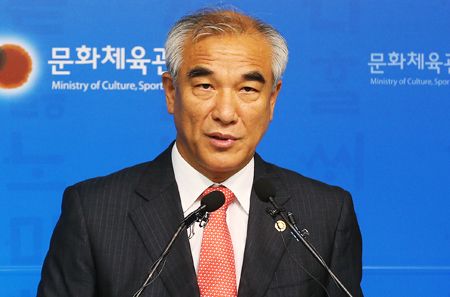
Government to further upgrade Korean language education

Since taking office a year ago, Culture Minister Choe Kwang-shik has branded himself a “hallyu minister.” The top culture policymaker has placed priority on expanding “hallyu,” or the Korean wave.
During a press conference to mark his first year in office, Choe stressed the importance of improving Korean language education abroad, as he sees it as a key tool in promoting the nation to the outside world.
To make his point, he referred to the latest YouTube sensation Psy, a Korean rapper-singer who topped the iTunes Chart last week with his single “Gangnam Style.” He is the first Korean artist to reach No. 1 on the U.S. online chart.
“What I find amazing about Psy is that he became an international sensation while singing in Korean. This sets him apart from other K-pop sensations like Wonder Girls, who sing in English for international audiences.
“With the popularity of Korean movies, TV dramas and songs, more people are becoming interested in the Korean language,” Choe added. “When I visit Korean culture centers overseas, I am constantly amazed by the rise of interest among local people in learning Korean.”
As part of efforts to boost the staying power of hallyu, the government plans to set up language institutes called “Sejonghakdang” around the world — 30 or more every year. They are named after the fourth king of the Joseon Kingdom (1392-1910), credited with the creation of the Korean alphabet.
The Sejonghakdang program started in 2007 with 12 facilities in major cities such as Tokyo and New York. Language classes take place at overseas Korean cultural centers or in universities that have Korean studies departments.
To improve the quality of Korean language education, the government will establish the Sejonghakdang Foundation in October. The foundation will develop standard textbooks to be used in these institutions and also train teachers to be dispatched there.
Choe has initiated various new measures to support the Korean wave in cooperation with various sectors.
As a result of the rising influence of hallyu on the business sector, the ministry founded the Hallyu Support Council in cooperation with several economic organizations on April 27. Main business partners in the council include the Federation of Korean Industries; the Korea Chamber of Commerce & Industry; and the Korea International Trade Association.
The ministry also conducted in-house organizational shifts to better support hallyu policies, establishing an ad-hoc department within the ministry for the first time in January. The department is led by the first vice minister of culture, Kwak Young-jin.
“We are finally becoming a nation that exports its own culture to other countries,” Choe said.
He previously taught ancient Korean history at Korea University in Seoul before joining the public service as the director of the National Museum of Korea in 2008. Choe also served briefly as the head of the Cultural Heritage Administration of Korea in 2011. He was awarded his current post in September 2011.
His ministry is also focused on finishing a landmark construction project, the Korea History Museum. It will open on Nov. 22 in central Seoul situated next door to the U.S. Embassy. It will be devoted to honoring Korea’s achievements in modernization since the end of World War II. <The Korea Times/Do Je-hae>


